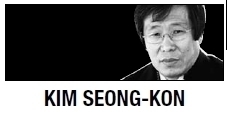 Due to the nature of my profession, I often get to meet people from various other countries and hear their impression of Korea. I have noticed they find three things in Korea especially hard to understand. One is Koreans’ perceived strong sense of equality and the other two are Korea’s social system and indifference to crisis.
Due to the nature of my profession, I often get to meet people from various other countries and hear their impression of Korea. I have noticed they find three things in Korea especially hard to understand. One is Koreans’ perceived strong sense of equality and the other two are Korea’s social system and indifference to crisis.
According to newspaper reports, Incheon International Airport has been named the Best Airport Worldwide each year since 2005. Hearing the news, foreign tourists surely agree, saying, “It’s an excellent airport, for sure.” However, they often complained about the same thing: “How come there are no fast tracks at Incheon Airport?”
Indeed, international airports in other countries almost always have fast tracks for those with top-class tickets. Airports in Southeast Asian countries even lay out red carpets on their fast tracks for high-spending passengers. At nearly any airport in the world, you can find signboards that read “SKY Priority” with fast tracks beside them. If you pay more, you deserve faster service and more convenience. That is the rationale for creating fast tracks at airports.
However, that is not the case in Korea. Koreans think everybody is equal and thus everybody should be treated accordingly. Koreans seem to think it would be unfair to provide special treatment to higher-class passengers. But foreigners would ask, “Isn’t South Korea a capitalist country?” In fact, I once heard a foreign passenger complaining, “In a capitalist country, you can buy fast service and convenience. It is neither an unfair privilege nor bribery. It is a given right which is fair and square.” I also heard another passenger with a pricy ticket muttering, “It took me 40 minutes to pass through the security checkpoint after standing in a long line. Do you call it fair for someone who paid more?”
However, many Koreans would not agree with them. They would think that something is fundamentally wrong and unfair with privileged tracks at the airport. Then they would blame their society and government for the seemingly unfair phenomenon. Of course, not all people in Korea would think that way, and yet, it is undeniable that quite a few Koreans would display hostility toward the privileged people, masking it under the umbrella of “social justice.” Equality is important, yet we need to figure out what Thomas Mann meant when he said, “A country where equality prevails over liberalism and freedom has no future.”
The second weird thing for foreign observers is that Koreans are preoccupied with exams because they think high exam scores will decide their fates and future. If you fail at the college entrance exam, for example, you will become a failure in Korean society. That is why you should start early to prepare for the college entrance exam — even from elementary school. It is no wonder then that the purpose of education in Korea is to train students to get high scores on entrance exams, not nurture students to become decent, cultured human beings.
In Korea, students are allowed to take the college entrance exam only once a year. But what if you were to catch a severe cold and thus suffer a headache, a runny nose or a coughing fit on the day of the exam? What if you have indigestion and diarrhea on that particular day? Just like that, your life is ruined forever. This is surely absurd and unfair, and yet we have neither a remedy for this chronic disease nor an intention to cure it. Meanwhile, we just helplessly watch our youngsters wither under the tremendous pressure of exams or turn into subhuman creatures seriously lacking humanity and decency.
In the Joseon era, the national exam called “Gwageo” was the only way to climb up the ladder of social ascension. Thus people bet everything on it. The tradition still persists in Korean society even in the 21st century. If you pass the bar exam, the high-ranking government officials’ exam or the diplomats’ exam, your future is guaranteed. If you fail the exams, your life is over and you will end up being a complete loser.
In the eyes of some from abroad, the third enigma is that few Koreans wear masks even when the peninsula is covered in dust and smog. Koreans do not seem to care about anything, including the extremely hazardous yellow dust coming from China, despite the possibility of developing lung cancer or other ailments. Both Chinese and Japanese people wear masks as a precaution in smoggy weather. Only Koreans think it looks bad to wear a dust mask, hopelessly confusing bravery with bravado. Others would find it hard to understand this incredible detachment and the reckless audacity of the Korean people.
Strangely in Korea, making prior preparations or taking precautions are regarded as a sign of weakness. It would be too late, however, when we discover belatedly that we have lung cancer.
Outside views on Korea are often enlightening and illuminating, and we should pay heed to them.
By Kim Seong-kon
Kim Seong-kon is a professor emeritus of English at Seoul National University and the president of the Literature Translation Institute of Korea. — Ed.

